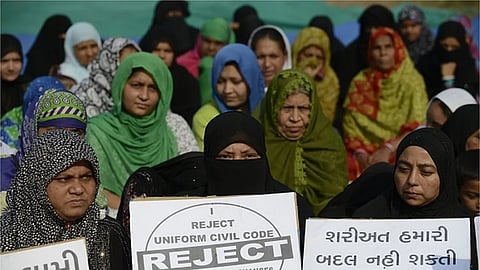

The Uniform Civil Code (UCC) has long been a contentious issue in Indian politics, with proponents arguing that it is crucial for national unity and equality. However, as the debate intensifies, it raises pressing questions about government priorities and broader societal implications.
While the UCC is framed as a step towards legal uniformity across religious communities, its implementation comes at a time when the government is largely overlooking critical economic disparities and the underdevelopment of key sectors such as education, healthcare, and ecology.
At the heart of this debate is Article 39 of the Indian Constitution, which envisions the equitable distribution of wealth and resources among citizens—a principle that remains strikingly neglected in contemporary political discourse.
India boasts one of the world’s fastest-growing economies, yet this rapid economic expansion has not translated into equitable wealth distribution. The World Inequality Report 2022 reveals a disturbing reality: the top 1% of the Indian population controls over 50% of the country’s wealth, while the bottom 50% holds a mere 4.1%.
This imbalance is further exacerbated by India's taxation system, where the top 10% contribute only 4% of the total GST revenue, while the bottom 50% bear a staggering 64% tax burden (Economic Survey 2023). Such disparities stand in direct contradiction to Article 39(b) and (c), which mandate the redistribution of material resources to serve the common good and prevent wealth concentration in the hands of a few.
In this context, the UCC seems like a misplaced priority. While legal uniformity is a noble objective, it should not take precedence over the fundamental economic issues that continue to plague the nation.
Article 39’s emphasis on economic justice—focusing on wealth redistribution, poverty alleviation, and the protection of weaker sections—should be central to policy making. Until these foundational concerns are addressed, the implementation of the UCC risks deepening socio-economic disparities rather than bridging them.
Uttarakhand recently became the first Indian state to implement the UCC, setting a precedent for other states considering similar measures. However, this development raises critical questions about government priorities, particularly in a state grappling with economic underdevelopment, high unemployment, and ecological crises.
Despite its rich natural resources and thriving tourism industry, Uttarakhand suffers from significant economic disparities and social infrastructure deficits. High unemployment rates have triggered mass migration of youth to metropolitan cities in search of better opportunities (Economic Survey 2023). Furthermore, the state’s healthcare and education sectors remain underfunded and poorly managed, leaving rural populations vulnerable.
Meanwhile, environmental degradation is accelerating, with rapid urbanisation and deforestation leading to increased natural disasters such as landslides and floods. In 2023 alone, flash floods devastated multiple villages, causing severe loss of life and property (World Inequality Report 2022).
Yet, instead of prioritising economic development, job creation, and environmental sustainability, the government has focused on personal law reforms—raising concerns about whether the UCC serves as a convenient distraction from deeper systemic issues.
The UCC in Uttarakhand has introduced several legal provisions affecting personal laws, inheritance rights, and marriage norms. One particularly contentious provision relates to live-in relationships. Under the new law, live-in partners must submit a ‘statement’ to the Registrar, who has the power to scrutinise and even reject the registration of such relationships.
This provision grants the state significant control over private matters, raising concerns over individual autonomy and the right to privacy (The Hindu, 2024).
Failure to register a live-in relationship could result in criminal penalties, including imprisonment or fines. Furthermore, couples providing false information face additional legal repercussions, and local police stations are required to be informed of live-in relationships, opening the door to unwarranted police surveillance and potential harassment (The Hindu, 2024).
While the UCC is promoted as a mechanism for legal equality, it has faced significant pushback from religious minorities, particularly Muslims, who view it as an attack on their personal laws. Muslim personal law has historically governed marriage, divorce, and inheritance within the community, and many fear the UCC’s imposition would force them into a legal framework that does not align with their religious beliefs (ANI, 2025).
Several Muslim organisations, including the All India Muslim Personal Law Board (AIMPLB), have signalled their intention to challenge the UCC in the Supreme Court, arguing that it violates Article 25, which guarantees the right to practice religion freely (NewsClick, 2025).
For many, the UCC is not merely a legal issue but also a cultural and religious concern, reinforcing the perception that its enforcement is driven by majoritarian politics rather than genuine legal reform.
The primary argument for the UCC is legal uniformity. However, the Indian Constitution, through Article 39, clearly prioritises economic justice as the foundation for social justice. Without addressing structural poverty, unemployment, and wealth disparities, legal reforms risk becoming superficial and ineffective.
A 2024 Time magazine report pointed out that India’s income inequality is now worse than under British rule, underscoring the urgency of implementing Article 39. If the government is genuinely committed to ensuring equality, it must prioritise economic rights before imposing legal uniformity.
The UCC, while ideologically and politically significant, should not overshadow the constitutional mandate for economic justice.
India’s escalating economic disparities, where the wealthiest 1% control over half of the national wealth, demand urgent attention. Uttarakhand’s experience with UCC serves as a stark reminder that legal reforms cannot take precedence over addressing structural poverty, unemployment, and inadequate public services—issues that are directly aligned with Article 39.
The government must reframe the UCC debate and ensure that economic rights, as enshrined in the Directive Principles of State Policy (DPSP), are prioritised above legal uniformity.
True reform will not come from imposing a single set of personal laws on India’s diverse population but from addressing the core issues of economic inequality, poverty, and access to basic services.
Until these fundamental socio-economic needs are met, any further push for the UCC will only deepen societal divisions and divert attention from the pressing demands of a just and equitable society.
Have you liked the news article?